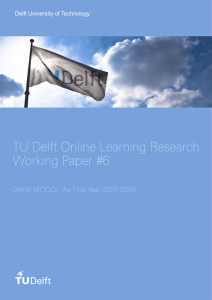Recent News
- Exploring Personal Experience and Value Creation in Postdigital Education: Insights from a Large-Scale MOOC Survey.
- Debugging the Divide: Exploring Men’s and Women’s Motivations and Engagement in Computer Science MOOCs
- Data for Learning in Engineering Education
- Data Driven Course Improvement – Pitch Presentation LCDA
- Enhancing quality assurance in continuing education through an organisational cultural change
Tags
Archives
- September 2024
- June 2024
- January 2024
- December 2023
- November 2023
- June 2023
- March 2023
- September 2022
- July 2022
- May 2022
- March 2022
- September 2021
- August 2021
- July 2021
- October 2019
- June 2019
- May 2019
- July 2018
- January 2018
- April 2017
- February 2017
- December 2016
- October 2016
- August 2016
- June 2016
- May 2016
- April 2016
- February 2016
- July 2015
- May 2015
- April 2015
- March 2015
- September 2014
- August 2014
- September 2013
Meta information
- TU Delft>
- TU Weblog>
- Online Learning Research>
- Working Paper 6: DelftX MOOCs, the First Year (2013-2014)
Working Paper 6: DelftX MOOCs, the First Year (2013-2014)
 This report is a cross-course comparison of the first five DelftX MOOCs. In the working papers #1 – #5 you will find detailed descrip- tions of each of the courses.
This report is a cross-course comparison of the first five DelftX MOOCs. In the working papers #1 – #5 you will find detailed descrip- tions of each of the courses.
The purpose of this analysis is to gain insight in the new opportunities and the new sources of data of this emerging online learning setting. The ultimate goal is to gain insights for enhancing DelftX educational provisions.
Introduction
This report is about the experiences with the first five MOOCs developed and executed at the Delft University of Technology (TUD) in the period 2013-2014. The aim is to describe and compare the MOOCs on the basis of user data and experiences including the insights from the teachers and developers. Since this was a first appraisal, the analysis was not implemented to proof any educational or political relevance, but to gather information for analytical purposes. The data were collected using different methods, including such diverse tools as statistical analysis of the systems data, social network analysis and interviews. More specifically, we included analysis of the subscription data from the participants, a pre- and post- survey, measured learning- related outcomes, i.e. performance and retention, interviews with teachers and developers, and the analysis of interaction in the forum and other media like Facebook. That being said, it should be reiterated that the analysis reported here are to be used and interpreted with caution, since the MOOC context is rather different from what higher education has experienced so far (DeBoer et al., 2014, Bayne et al., 2014).
The purpose of the analysis was to get a better insight in the development and performance of the ‘xMOOCs”, intended for large audiences, with the ultimate goal to support the stakeholders at Delft on all levels to make better (design) decisions. The stakeholders include:
- DelftX team working on a strategic level, involved in organizational issues, business and financial decisions
- Teachers and developers designing their courses, choosing media and instruments, organizing support
- New Media Center working on content design and production
- Evaluation team dealing with the monitoring and analysis applying an evaluation framework and accompanying instruments.
The focus in the analysis was on the one hand on the MOOC as a research object with the purpose to improve our understanding of (online) education as represented by the MOOCs. On the other hand, we aimed to better understand the opportunities the MOOC setting offers for research in course-related subjects: the MOOC as a research instrument. MOOCs attract people from all over the world, with very different cultural backgrounds, working experiences and as such are a great source. From experiences so far it is clear that MOOCs offer opportunities for high-quality research in a rather controlled environment with large numbers of participants from all ages and different locations. A bit of caution should be applied here though, because the term Massive is also to interpret as the massive variety of the student population and the kind of MOOCs, which makes it difficult to derive definitive conclusions despite the richness of the sources.
2013-2014 was the first year of TUD MOOC production and execution and a couple of issues need attention to learn and improve. As could be expected the stakeholders still have very different opinions about online and open education and the purpose (and future) of MOOCs. This coincides with a traditional on campus educational approach that, up until now, has dominated the MOOC development, but is expected to change when more experiences and examples become available. With the MOOCs there is a new data context, which contains lots of numbers, which not necessarily can be regarded for the underlying contribution to educational improvement. The university is confronted with a very different population of learners, which is demanding but enrich the university as a whole and in that sense post-hoc analyses, as applied here, are of great use to discover the working field of the MOOCs, but new lines of research are needed to develop strategies for the improvement of teaching and learning in such environments (Reich, 2014, Macleod et al., 2015)).
It is evident that at the TU Delft these first MOOCs have initiated not only a discussion, but also raised the awareness by teachers of the value of learning innovation and as such created a momentum that favors further development.
Reference
De Vries, P., Hennis, T., Skrypnyk, A., (2015). TU Delft Online Learning Research Working Paper #6: DelftX MOOCs, the First Year (2013-2014). Delft, Delft University of Technology. ISBN 9789461864611.





















Comments are closed.